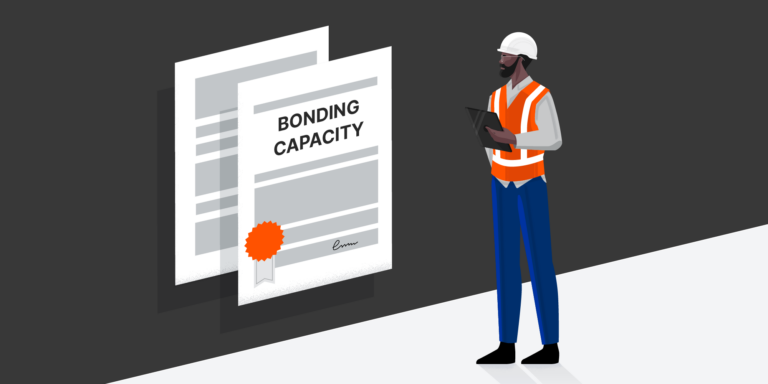— 7 min read
The Contractor’s Guide to Increasing Bonding Capacity
Last Updated Aug 12, 2024
Last Updated Aug 12, 2024

Contractors who want to work on bonded construction projects will need bonding capacity — the ability to secure a bond to help protect the owner against performance, default, financial or warranty issues. The dollar amount of bonds extended to a contractor by a surety company is called their bonding capacity.
In this article we’ll cover what bonding capacity is, how sureties determine it and what contractors looking to grow their business can do to increase their bonding capacity.
Table of contents
What is Bonding Capacity?
Bonding capacity is the amount of credit a surety company is willing to extend to a contractor. On a project basis, this is called individual bonding capacity or single job capacity. Many contractors have multiple bonded projects in progress, so they will also have an aggregate bonding capacity, which is the limit of all the bonds that the surety company is willing to extend to them.
Parties to a Construction Bond
The construction company that purchases a construction bond is the principal. The obligee is the party protected by the bond. The principal purchases the bond from a surety company, which investigates them to determine their bonding capacity.
While construction bonds may seem similar to construction insurance, they are distinct in that bonds are a three-party agreement where the surety guarantees that the principal will fulfill their agreement with the obligee. Unlike insurance, if the surety pays a claim against the bond, they will then collect that amount from the principal.
Increasing Bond Capacity
Having a higher bonding capacity allows general contractors to bid on larger—often public—projects. Even for non-bonded projects, owners sometimes prequalify bidders by looking at their bonding capacity. A GC with a higher bonding capacity can give owners confidence that the company has completed a portfolio of successful contracts.
Like a credit card limit, bonding capacity is a flexible parameter that can change based on how comfortable the surety company feels about the contractor's overall performance. When a contractor wants to bid on a project that would take them above their current bonding capacity, they approach the surety company to ask for an increase, just like you might ask to raise your credit card limit to make a large purchase.
Raising your bonding capacity by bidding on “stretch” projects slightly outside your current limit is good business practice and can help show sureties that you may be ready to take on more work.
General contractors have several financial instruments and relationships to keep their complex businesses running smoothly. In addition to working with a bank for a line of credit and various types of insurers, GCs who work on bonded projects need to have a working relationship with a surety broker and a surety company to acquire bonds to cover the projects in their pipelines.
Factors That Determine Bonding Capacity
Contractors wanting to grow their businesses often need to extend their bonding capacity to take on larger projects. Understanding the factors that affect your bonding capacity can help you strengthen your case to the surety company to cover the contracts you want to pursue.
Financial Stability
Bonding capacity is a credit-based relationship, so financial factors carry the most weight in decisions about the limits. When obtaining your first bond, you must provide three years of third-party vetted financial statements. For all contractors seeking a bonding capacity increase, the underwriters for the surety will look carefully at the most recent financials to decide if it is warranted. These include:
- Debt level
- Net valuation of the company
The relationship between certain financial figures can help determine if a contractor is overextended in terms of the work they have committed to, or whether they have the reserves to maintain cash flow. As sureties examine the submitted financials, there are two primary ratios that they look at:
- Equity to backlog: How much buffer does this company have at the current level of backlog?
- Cash on hand to short-term bills: Can they meet the necessary obligations — and do they have the liquidity to handle any bumps in the road?
The relationships between these numbers are a quick litmus test for how much staying power a company would have in challenging circumstances that arise at times in construction businesses.
Personal Guarantees
Sureties also look at the personal credit reports of the owners to help them determine the business's creditworthiness. Mid-market and smaller contractors are often required to have personal guarantees attached to their bonds but, over time, may be able to negotiate to eliminate these.
Backlog
A construction backlog — the projects a contractor has under contract and their expected costs — are part of the financial equations that underwriters look at for bonding capacity. Any portion of a contract that is not yet complete is part of that contractor’s backlog, and the remaining costs associated with that work affect projections of their financial picture going forward.
The risk associated with your backlog is a concern for surety companies. WIP reports give a snapshot of the financial details of the current status of projects in a contractor’s pipeline.
Experience
Surety companies consider a contractor’s successful completion of past projects to know that their company is capable of specific types of projects. The more projects a GC successfully delivers, the more a surety can trust that they have the capacity and competence to complete future jobs.
Type of Projects
The types of projects contractors plan to take on, compared to their past projects, will help determine their bonding capacity for a new project. If a construciton company has only completed residential projects so far, but want to bid on a water treatment plant, it might be unclear if they can complete such a different type of build.
If they have completed similar projects, however, like an apartment building or office space, they can make the case that their previous experience can assist then with completing the scope of a new project. Underwriters will look at the feasibility of a contractor’s company completing a more ambitious project when determining whether they will extend a bid bond.
Choosing a Surety Company
Surety companies and brokers vary in the types of clients they serve. Some work with earlier-stage companies with a short track record, while others only work with well-established general contractors. A broker or surety agency can help contractors find an appropriate surety company that will fit their company’s profile. GCs should ensure that the sureties they choose have deep experience in both the construction industry and surety business.
Stay updated on what’s happening in construction.
Subscribe to Blueprint, Procore’s free construction newsletter, to get content from industry experts delivered straight to your inbox.

5 Tips to Increase Bonding Capacity
Once a company establishes a relationship with a surety company, investing in that relationship will build trust and history to help the company increase its bonding capacity for reasonable projects as it grows.
1. Practice sound financial management.
Companies should also continue mindful accounting and budgeting practices. It's important to keep the surety informed of its financial status when seeking capacity increases.
2. Build a portfolio of successful projects.
When keeping financial and business records up to date, general contractors should add project successes to their portfolio. Every project completed satisfactorily gives surety companies more faith in a business’ ability to deliver.
3. Plan an incremental increase in capacity.
Sureties look at the magnitude of the increase in capacity based on a company’s track. Businesses should plan to gradually stretch their company’s capacity for project size and type. It’s unrealistic to jump from $1 million projects to a $50 million bid. When companies expand the scope of its projects, they gain experience to handle more contracts, but should maintain sound business practices to keep up with changes.
4. Diversify projects in the pipeline.
A company that diversifies the types of project in its pipeline — such as public and private, or residential and commercial — mitigates risks if one of the sectors dips. As with changes in dollar amount, the company should broaden its capabilities to handle different geographic areas or project types gradually and consider adding some diversity to help stabilize its bottom line.
5. Request increases in advance.
Don’t wait until the last minute to ask for a bonding capacity increase. Start communicating with the surety company early in the bid process so there is time to determine the firm’s capabilities. Make realistic and comprehensive plans for jobs to bid on, and work closely with a broker and surety to tie up any loose ends.
When building a strong relationship with a surety company, the growth in trust over time can help negotiate bonding capacity increases that make good business sense. GCs who demonstrate sound business practices, successful project deliveries, and responsible growth strategies are more likely to obtain increases in their bonding capacity when they request them.
Was this article helpful?
Thank you for your submission.
100%
0%
You voted that this article was . Was this a mistake? If so, change your vote here.
Scroll less, learn more about construction.
Subscribe to The Blueprint, Procore’s construction newsletter, to get content from industry experts delivered straight to your inbox.
By clicking this button, you agree to our Privacy Notice and Terms of Service.
Categories:
Tags:
Written by
Mike Grillo
Mike Grillo, a founding partner of Procore Risk Advisors, brings over a decade of experience in construction surety credit underwriting and brokerage. Mike previously served as a Senior Surety Broker at Aon PLC and Assistant Vice President at Zurich North America, aiding middle market and national contractors. Mike resides in Chicagoland with his family.
View profileJulia Tell
42 articles
Julia Tell is a freelance writer covering education, construction, healthcare, and digital transformation. She holds a Ph.D. in Media & Communications and has written for publications including Business Insider, GoodRx, and EdSurge, as well as nonprofits, international businesses, and educational institutions.
View profileExplore more helpful resources

How the Balance Sheet Affects Surety Bond Underwriting
In construction finance, a balance sheet is a financial document that a business creates. It lists all of the business’s assets, liabilities, and owners’ equity to give a snapshot of...

How Construction Payment Bonds Work — and Why They Matter
From the smallest home renovation to the largest public works project, the world of construction is backstopped by one fundamental principle: Trust. Owners and public agencies must be able to...

Performance Bonds for Construction Explained
Performance bonds provide a guarantee that a contractor will fulfill all of their obligations under a construction agreement. Performance bonds are a subset of contract bonds and guarantee that a...

Contractor License Bonds: Everything You Need to Know
In order to perform construction work, many states require contractors to be “licensed and bonded.” What does that mean? Well, every state sets its own rules for contractor licensing, and...